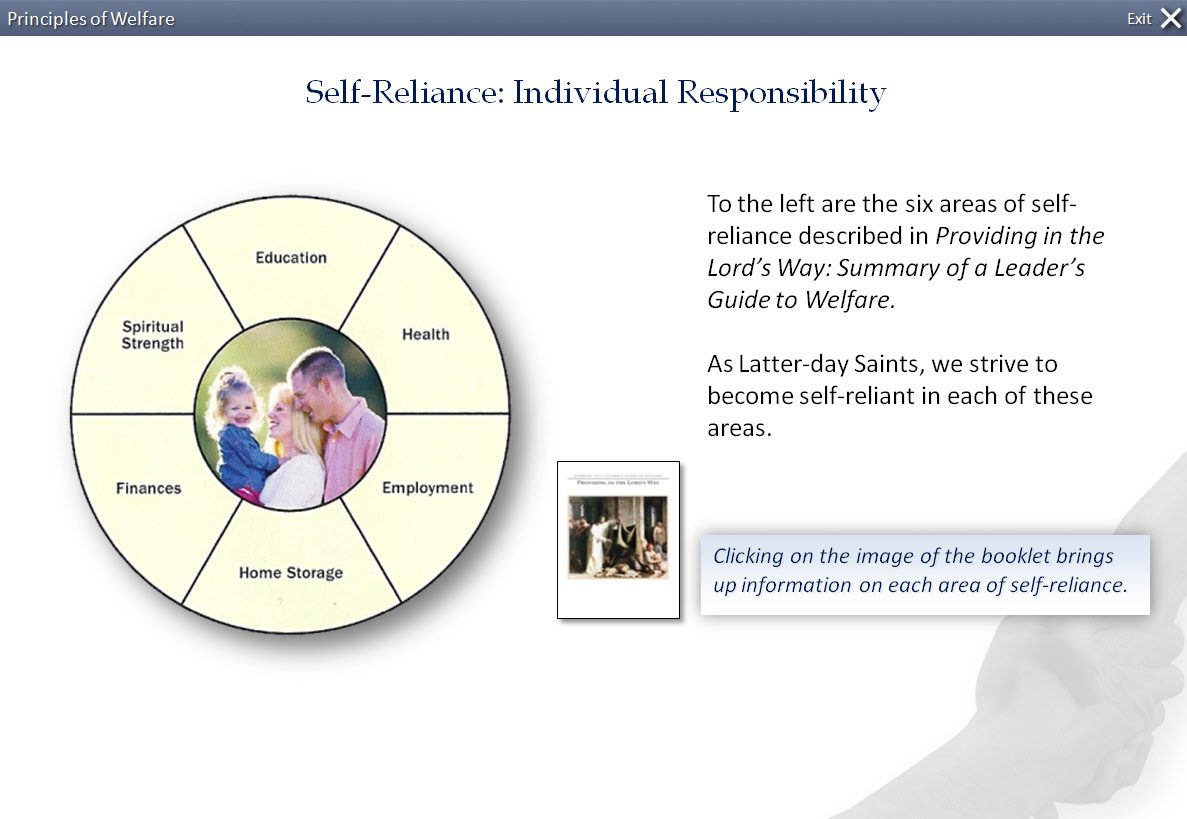A few years ago, a very good Christian couple, both inspiring servants of Christ in many ways, expressed concern to me about the LDS approach to food storage and emergency preparedness. The were firm believers in the concept of the Rapture and believed that when times got really tough, the Lord would be taking them and other good Christians away. They saw the food storage program of the Church as an expression of lack of faith in Christ. I tried responding by explaining that God has often commanded his people to prepare for difficult times–Joseph and the seven years of plenty as a time to prepare for famine, Noah and the ark preparing for flood, etc.–and that preparing for the future in respond to God’s commands is an expression of faith, not lack of it. I also explained it’s not just focused on end times, but that such preparations have helped our people in numerous events and circumstances already, from hurricanes to unemployment. It’s just a wise, even inspired, thing to do. That helped little, but didn’t remove their fundamental concerns.
Those peering into the Church can easily get the wrong impression. For example,, tThis morning to help me learn a little more about some of my duties in the Stake High Council, I began reviewing some of the wonderful resources the Church has online for members and leaders. There is a page on “Welfare Lessons for Church Leaders” at the Church’s resource-rich Provident Living site (providentliving.org) that has the presentation, “Principles of Welfare” (sadly, though it is a PowerPoint presentation, it is only available an executable file that one has to install, apparently to make sure that all the video content in it plays properly). One of the slides is shown below. The title is “Individual Responsibility,” a term one can hear frequently in LDS circles. I can imagine how an outsider would look at that and say, “What about faith in Christ? What about trusting in Christ, not our works?” There is a risk of that kind of response, but it misses some important points.
The Lord has always urged his people to prepare in various ways. It’s a common term in the divine lexicon. Consider the parable of the faithful steward in Luke 12:42-48, where the steward needed to “prepare” and be ready for the Lord’s coming. Consider the parable of the ten virgins in Matthew 25, who needed to be ready with oil in their lamps. The most important preparation may be spiritual, but there are also times when the challenges will be temporal. The early Church was concerned about the physical as well as spiritual welfare of its members, working for the temporal relief of widows, orphans, and the needy, and sharing their goods for the common welfare of the Church.
Today, in a time of increasing tribulation and calamity, the Lord has kindly given us instruction that we should prepare. Getting out of debt, having food and water ready to handle an emergency or to better withstand economic turmoil, and being prepared with education, physical health, financial savings and discipline, elimination of addictions and other bad habits, is part of His plan to bless us and help us be more able to serve Him and bless others in these critical times. Such actions and attitudes do not run contrary to faith in Christ, but exemplify faith in Him and trust in His guidance to us. These are the kind of works without which faith may indeed die: there’s a reason why the Bible says “faith without works is dead.”
Faith in Christ calls for personal responsibility for our stewardship. We must be wise stewards, preparing now and seeking to do what the Lord has commanded us, that we may be ready when he returns. May we each personally prepare for the challenges ahead and not expect to find security and comfort in ease, much less quantitative easing (oh, did I mention the dollar must eventually tank with the thieving fiscal policies being perpetrated by Fed and company?). There are hurricanes ahead, and we’re probably not going to miraculously delivered by ignoring the warnings and refusing to prepare. Faith leads to action, the kind of action the Church urges us to take to advance the welfare of our families and those around us, in addition to (or even as part of) spiritual preparation.











Your evangical protestant friends may not appreciate it, but I have long enjoyed this Islamic parable:
One day Prophet Muhammad (peace be upon him) noticed a Bedouin leaving his camel without tying it and he asked the Bedouin, “Why don’t you tie down your camel?” The Bedouin answered, “I put my trust in Allah.” The Prophet then said, “Tie your camel first, then put your trust in Allah” (At-Tirmidhi).
I always enjoy reading your blog, especially the recent posts refuting the indefensible claim that Mormon are somehow not Christians. In this particular instance you mention that your demonstration of instances in the Scriptures where the Lord has commanded his children to make physical preparations for coming trials was ultimately unpersuasive.
I suggest that your points were unpersuasive because these folks were not interested in being persuaded, and were engaging you in conversation in bad faith; that is, no matter what you could have shared with them they would not have altered their position. Speaking from vast experience living as a member of the Church in the so-called Bible Belt, this is a common MO among evangelical protestants.
My self-identification as a Christian, and by extension the self-identification of the LDS Church as a Christian church, is a fundamental expression of faith in Christ. To relent and say I/we are not Christian would be failing to stand as a witness of God in all places, as we are directed to do in the Book of Mormon.
It is a particularly disgusting and virulent form of judgmentalism to deny that someone is a Christian in spite of their protestations.
So, what is a Christian? Is the word "christian" like the word "marriage"? – Define it on the fly?
Decades before the gay marriage debate, I heard of someone being "married" to his job. I guess it was a way of saying that the time he should have spent with his wife was spent at work.
Recently I heard the idea of someone wanting to be married to a pet. Maybe someone will soon seek marriage to a hair clip. After all, a lot of time can be spent with such a thing!
If Christianity is about losing ourselves in service, believing the teachings of Jesus, developing the discipline of a disciple, I guess we could water the meaning down to wearing the badge of (claiming to be) a Christian but I wouldn't call it "a particularly disgusting and virulent form of judgmentalism" to hold that the word has more meaning than the most watered down uses of the word "marriage."
I do disagree with those who deny our Christianity on the basis of our teachings of Christ's divinity and wanting to live a Christian life.
I think if we want to be strict and biblically sound, we could rely on what the Bible has to say about being Christian. The word "Christian" occurs only 3 times. Each occurrence should be examined to learn more about what it means to be Christian. That will be my next post. That faint rumbling you hear is the sound of tables turning….
Yeah, it's utterly amazing what people use to deny that we (and others with whom they disagree) are not Christian.
Food storage? Really?!
The people with food storage concerns weren't saying we weren't Christian because of that–I think they knew from experience with us that we really believed in Christ–but the concern was that food storage showed a lack of faith.
I meant to ask them if they ever filled up their gas tank before a long journey, especially when going to religious events. With faith, who needs to stock up on gasoline?
This reminds me of the old joke about the man caught in a flood. He climbs onto his roof and when someone comes by in a boat offering to rescue him, he says, "No thanks, the Lord will save me." The same when a helicopter hovers over him. Finally the water rises and he drowns. At the pearly gates he says, "Lord, I trusted you and you didn't save me!" The Lord says, "I sent a boat and a helicopter–what more did you want?"
The Lord has sent us prophets telling us to prepare. What more do we want?"
Virginia
@Anonymous (above this comment) –
Funny that you bring up that joke. Someone actually mentioned it during Sacrament meeting on Sunday.
Self-reliance and preparation not a replacement for faith in any way. We recognize that no matter what we do in preparation, God can bring about circumstances to overwhelm us. In doing that, we recognize our utter dependence on Him, and the need to follow His commandments and live in the spirit to be where we need to be.
Self reliance is really about being in a position to help others when those circumstances arrive.